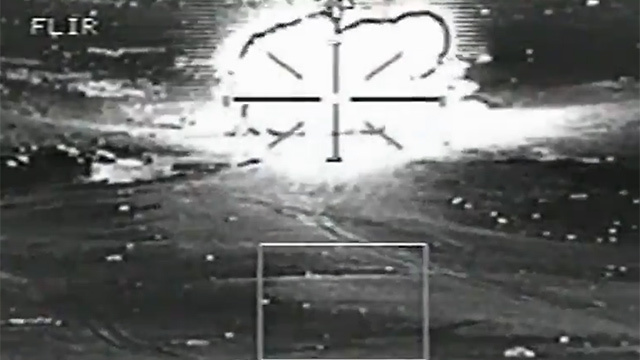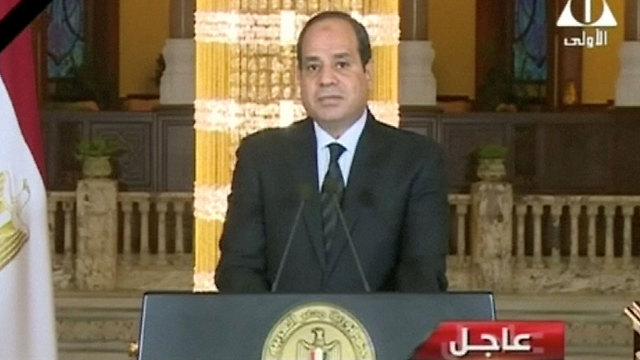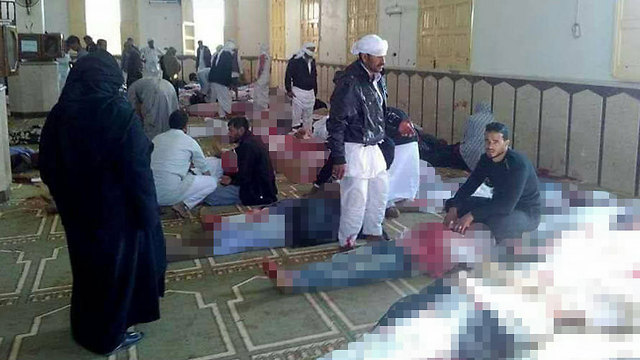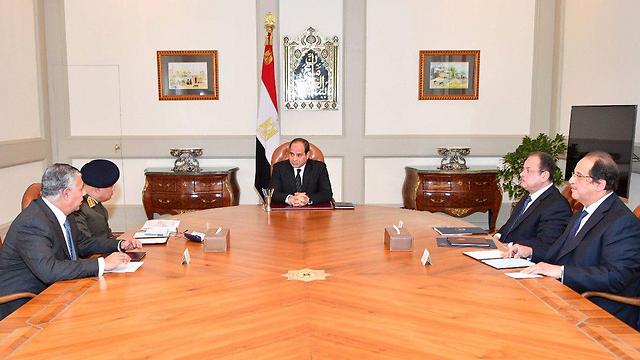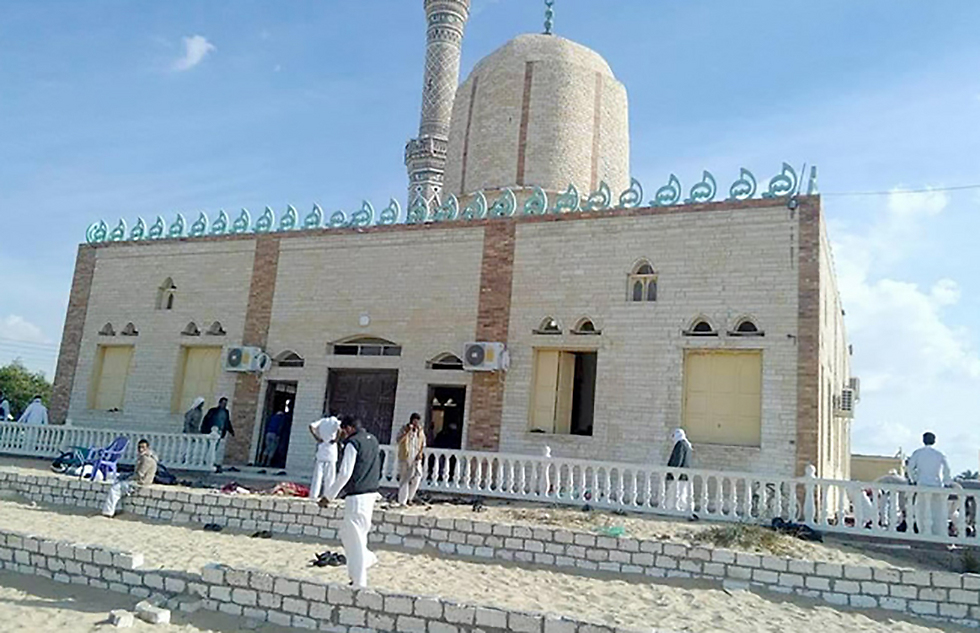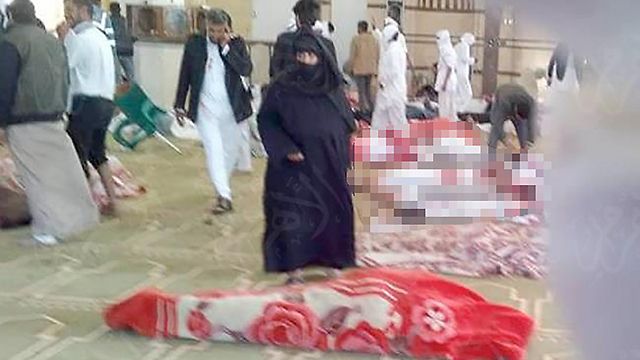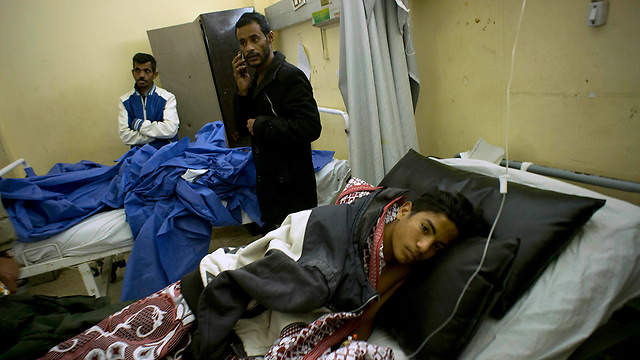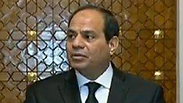

Death toll in Sinai attack climbs to 305, terrorists carried IS flags
Egyptian President el-Sisi reportedly orders widespread military, security operations to capture terrorists who participated in attack on Sinai mosque; at least 305 people killed in attack, including 27 children, with 128 people hospitalized; terrorists were seen carrying Islamic State flags.
Death toll in the terrorist attack on a mosque in the town of Bir al-Abd in the Sinai Peninsula climbed to 305, with 27 children being among those dead, said Egypt's chief prosecutor Nabil Sadeq. Sadeq also added 128 people were hospitalized due to wounds suffered in the attack.
The chief prosecutor then went on to shed some light on the attack and its details, saying 25-30 terrorist carrying Islamic State (IS) banners participated in the assault, despite the fact IS had yet to claim official responsibility. The terrorists then got into positions in front of the door to the mosque and its 12 windows.
Carrying automatic weapons, they began firing at worshipers coming in for Friday's prayer. Sadeq also noted terrorists arrived on five off-road vehicles and torched seven vehicles belonging to worshipers.
Egyptian media outlets reported Friday President Abdel Fattah el-Sisi ordered the army to undertake a widespread military operation in Sinai following a terrorist attack that claimed the lives of 305 people, the deadliest such attack in the country's history.
El-Sisi reportedly ordered Chief of staff of the Egyptian Armed Forces Sedki Sobhy and Interior Minister Magdy Abdel Ghaffar to have the army conduct far-reaching military and security operations in the north and center of the Sinai Peninsula. Threat levels were also raised all across Egypt, with the Interior Ministry saying exiting security will be increased in places of worship and vital facilities.
The military operations' goal was to capture the terrorists who participated in the attack on the Al Rawdah mosque in northern Sinai's Bir al-Abd, situated west of El Arish. Egyptian air force, infantry and civilian police forces will all participate, according to reports, under the direction of the army's chief of staff.
The Egyptian army said its attack on terrorist strongholds in northern Sinai was underway and published a video documenting alleged air force attacks. An Egyptian army spokesman said Friday dozens of terrorists were killed in such airstrikes.
Arabic-language Sky News reported 30 terrorists killed by Egyptian forces in the village of a-Risan in central Sinai as part of security raids, whereas the Al Arabiya network reported Egyptian infantrymen massively descended on several targets in Egyptian Rafah.
The Sky network also reported earlier the air force had destroyed two vehicles carrying 15 terrorists who were also involved in the attack. The attack was reportedly carried out by two drones, with surveillance operations in progress on additional vehicles.
Friday prayers turned into a bloodbath Friday afternoon, with terrorists setting off explosive charges and then opening fire on local worshipers. Egypt reported 235 people were killed and 109 wounded, most of them civilians. Egyptian television also reported children were among those killed.
President el-Sisi, a former armed forces commander who presents himself as a bulwark against Islamist militants in the region, convened an emergency security meeting soon after the attack, and order military and police forces to increase security detail on Sinai places of worship.
In a televised statement following the meeting, el-Sisi stressed that the attack "will not go unpunished."
"This treacherous, despicable act reflects its perpetrators' inhumanity. The hand of justice will reach all those who participated, assisted, financed or incited this attack. The pain felt by the Egyptian people in these dark times will not be for naught," the president's statement further said.
In an additional speech, el-Sisi remarked, "We will have a response against these extremists very soon. This attack will only strengthen our determination and force in the fight against terror."
President Donald Trump denounced the attack Friday. In a tweet, Trump wrote, "Horrible and cowardly terrorist attack on innocent and defenseless worshipers in Egypt. The world cannot tolerate terrorism, we must defeat them militarily and discredit the extremist ideology that forms the basis of their existence." Trump later announced he will be telephoning el-Sisi.
Horrible and cowardly terrorist attack on innocent and defenseless worshipers in Egypt. The world cannot tolerate terrorism, we must defeat them militarily and discredit the extremist ideology that forms the basis of their existence!
— Donald J. Trump (@realDonaldTrump) November 24, 2017
Qatari Emir Sheikh Tamim bin Hamad Al Thani sent el-Sisi a condolence message following the attack, despite the acrimonious dispute between the two countries and the fact Egypt has joined three other countries in boycotting Qatar.
The attack took place only a day before the Rafah Border Crossing connecting Egypt and the Gaza Strip was slated to be reopened again for three days. Following the attack, Egypt announced the reopening will be postponed.
Many of those killed and wounded in the attack were reported to belong to the local a-Sawarka tribe, which refused to align itself with Islamic State forces in the peninsula and therefore suffered the alleged revenge attack.
Eyewitnesses and a police source said the terrorists were apparently trying to hurt the security personnel present during prayer at the mosque, 40 kilometers west of the Sinai capital of El Arish.
Men in four off-road vehicles opened fire on worshipers, according to Egyptian police. The country's Ministry of Health also alleged the terrorists later fired at ambulances that attempted to remove those wounded in the attack to local hospitals.
While the Islamic State had been defeated in Syria and Iraq, its Sinai Peninsula chapter continues waging war on the Egyptian government. In 2014, following a terrorist attack that killed 31 soldiers, el-Sisi declared a state of emergency in the region and dubbed it "fertile ground for terror and terrorists."
Maj.-Gen. (res.) and former GOC Southern Command Yom-Tov Samia commented about the attack. "Rumors of the Islamic State's death are greatly exaggerated. ISIS (Islamic State of Iraq and the Levant) Sinai Province strikes again, which signifies the chief target is, in fact, Israel, with Egypt merely standing in its way," he opined.
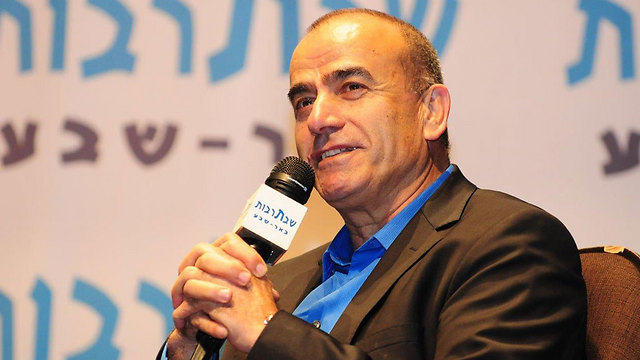
"A scenario in which IS in Sinai links up with Hamas in Gaza is very real. The massive IS presence in Sinai and their attack are the product of the Muslim Brotherhoods' reign in Egypt. While it may have only lasted a single year, it was enough to make it plain to the world why Israel cannot afford the existence of such regimes near its borders. A determined retaliatory action is necessary, fully coordinated with Egypt, to make it clear Israel is standing on guard," Samia concluded.
Victims recount the attack: 'Where was the army?'
The hospital in Ismailia admitted many of the 109 victims who survived the deadly attack.
One of the wounded, a man called Majdi, recounted the horror from his hospital bed. "Between ten and twenty armed men entered the mosque and obliterated everything in sight. Some of the terrorists were wounded, but there were many more victims. When the shooting started everybody started fleeing in a blind panic and kept running into each other, but I caught a glimpse of men with masked faces wearing army fatigues," he said.
Another victim named Mohammed Ali said 18 members of his extended family were killed in the attack. The mosque belonged to a local clan, the Jreer, so many of its members worshipped there. "Where was the army? It's only a few kilometers away. This is the question we cannot find an answer to," he said.
Abdullah Abdel-Nasser, 14, who was attending prayers with his father, said the shooting began just as the cleric was about to start his sermon, sending panicked worshippers rushing to hide behind concrete columns or whatever shelter they could find. At one point, a militant shouted for children to leave, so Abdel-Nasser said he rushed out, though he was wounded in the shoulder by shrapnel and a bullet.
"I saw many people on the floor, many dead. I don't think anyone survived," he said at a hospital in Ismailia.
The Associated Press contributed to this report.














